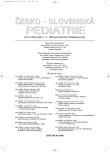-
Medical journals
- Career
Occurrence of Polymorphism of Tumor Necrosis Factor Alpha (TNFα-308) in Children with Chronic Inflammatory Bowel Diseases
Authors: I. Čierna; P. Švec; K. Jančovičová; L. Kovács
Authors‘ workplace: II. detská klinika LFUK a DFNsP, Bratislava prednosta prof. MUDr. L. Kovács, DrSc., MPH
Published in: Čes-slov Pediat 2006; 61 (2): 64-70.
Category: Original Papers
Overview
Background:
Experimental and clinical studies support the important role of tumor necrosis factor alpha (TNF alpha) in the pathogenesis of inflammatory bowel disease (IBD). Expression rate of TNF alpha, which is one of the key regulators of inflammatory processes, is genetically determined. This interindividual variability of expression might be influenced by functional polymorphisms in the gene of TNF alpha located on chromosome 6. The -308 G/A polymorphism belong to the most recognized polymorphisms. The promoter with the minor allele A shows a significantly higher transcriptional activity compared to the common allele G.Objective:
The authors analyzed the frequency of the -308 G/A TNF alpha polymorphism in a cohort of pediatric patients suffering from Crohn’s disease (CD) and the ulcerative colitis (UC). Thus far, no study of this kind has been conducted in Slovakia and there is less data available from pediatric populations in the world literature compared to adults, as well.Patients and methods:
The authors analyzed the polymorphism status in the position -308 of the TNF alpha gene using a polymerase chain reaction – restriction fragment length polymorphism (PCR-RFLP) method in 75 pediatric patients with IBD (36 UC and 39 CD) and 120 healthy controls. They estimated the genotype (GG, GA, AA) as well as the allele frequencies (G, A). The frequencies of genotypes were related to relapse rates of the patients.Results:
In the Crohn’s disease group the authors found a significantly decreased allele frequency of the studied polymorphism compared to healthy controls (p = 0.049). On the contrary, they found no significant differences in allele frequencies between the UC patients and healthy controls (p = 0.615), between UC and CD group (p = 0.191) and between healthy controls and the whole IBD group (p = 0.11). They did not find any statistically significant differences in relapse rates between wild type and allele carriers.Conclusion:
The authors report a significantly decreased frequency of the allele A of the TNF alpha -308 polymorphism in pediatric patients with Crohn’s disease. They could not show any association between the genotypes (GG, GA, AA) and relapse rates in their cohort.Key words:
ulcerative colitis, Crohn’s disease, tumor necrosis factor alpha polymorphism TNF alpha-30
Labels
Neonatology Paediatrics General practitioner for children and adolescents
Article was published inCzech-Slovak Pediatrics

2006 Issue 2-
All articles in this issue
- Occurrence of Polymorphism of Tumor Necrosis Factor Alpha (TNFα-308) in Children with Chronic Inflammatory Bowel Diseases
- Low Cardiac Output and Myocardial Function Following Cardiac Surgical Treatment in Children – is there a Difference in the Effect of Phosphodiesterase Inhibitors?
- Care of the Newborns on the Waves of Time or View to the History of the Neonatology
- Neonatal Hyperekplexia
- Brain-type Natriuretic Peptide (BNP) and Cardiovascular Risk in Children
- Procalcitonin – its Present Position in the Diagnosis and Prognosis of Inflammation A review
- Czech-Slovak Pediatrics
- Journal archive
- Current issue
- Online only
- About the journal
Most read in this issue- Care of the Newborns on the Waves of Time or View to the History of the Neonatology
- Neonatal Hyperekplexia
- Procalcitonin – its Present Position in the Diagnosis and Prognosis of Inflammation A review
- Brain-type Natriuretic Peptide (BNP) and Cardiovascular Risk in Children
Login#ADS_BOTTOM_SCRIPTS#Forgotten passwordEnter the email address that you registered with. We will send you instructions on how to set a new password.
- Career

